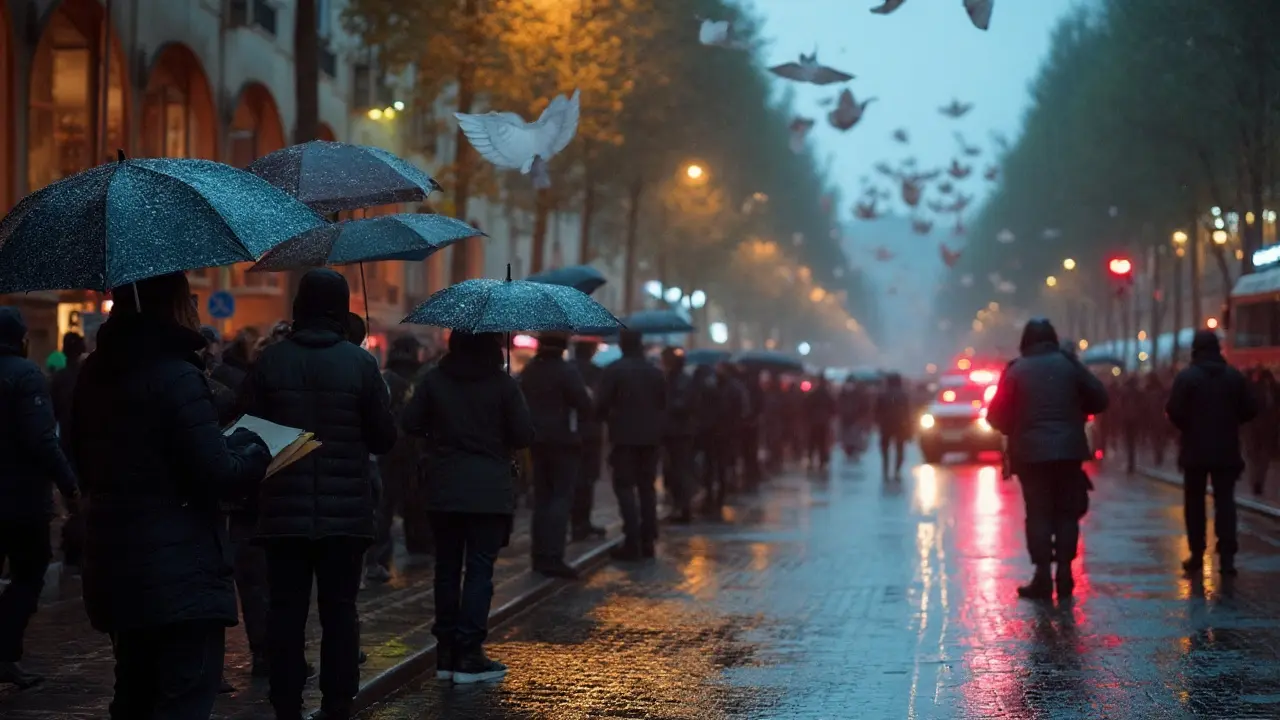TL;DR
- The story stretches from Belle Époque courtesans to platform-era escorts, shaped by law, media, and tech.
- Key turning points: the 1946 brothel ban, the 2003 “passive soliciting” law, the 2016 client criminalization, and 2024 Olympic-era crackdowns.
- Flashpoint cases-Zahia (2014), the Carlton affair (2015), and high-profile raids-reset public perception.
- Digital shifts changed how work is found, screened, and paid, but also introduced new risks.
- Use the mini-FAQ and checklists to separate myth from fact and find reliable sources without sensationalism.
Paris, memory, and the moments that stuck
Paris has a long memory. If you follow nightlife, law, or culture, you already know the debate over sex work here never stays quiet for long. The city keeps hitting reset-through laws, scandals, crackdowns, and films-each time reshaping what the Paris escort industry looks like and how people talk about it.
What you’ll get here: the defining moments people still reference years later; why they mattered; how laws and platforms bent the market; and how to read headlines without getting misled. This piece is for readers who want a clear narrative, not gossip. I’ll highlight a handful of nights, rulings, and front pages that truly moved the needle-and the ripple effects they left behind.
Quick jobs you probably want done after clicking this headline:
- Grasp the timeline and which events changed rules on the ground.
- Understand how French law treats escorting today-and why that changed in 2016.
- Recall the big scandals and what courts actually decided.
- See how digital platforms, payments, and safety practices evolved.
- Get a clean, source-backed summary of where things stand in 2025.
From courtesans to codes: a short, honest timeline
You don’t need a textbook to see the arc. Paris has cycled through glamour, regulation, and reinvention for more than a century. Here’s the spine of the story, minus the fluff.
- Belle Époque (late 19th-early 20th century): High-society courtesans like La Belle Otero and Liane de Pougy were part celebrity, part scandal, shaping the myth of Paris as a city of salons and secrets. It wasn’t “escorting” in the modern sense, but it set the cultural template: discretion, patrons, influence, and performance.
- 1946 - The Marthe Richard law: France shut down legal brothels nationwide. The move didn’t end sex work; it pushed it into apartments, hotels, and the shadows. For Paris, whole neighborhoods-think the old maisons of Pigalle and the Grands Boulevards-changed from licensed venues to informal networks. This is the first huge pivot.
- 1975 - Church occupations and the rise of activism: The most famous occupation happened in Lyon’s Saint-Nizier church, but it sparked solidarity actions in Paris and seeded a rights-based language that still shapes the city’s debates: safety, health, autonomy, and dignity.
- 1990s-2000s - Media and moral panics: As classifieds and early websites appeared, the escort label began drifting from “agency” to “independent with a phone and a listing.” Paris saw cycles of police operations in well-known strolls; Rue Saint-Denis became a shorthand for the city’s street economy, even though the bulk of higher-end work moved indoors and online.
- 2003 - The “passive soliciting” law: France criminalized “passive soliciting,” letting police sanction presence in public spaces linked to sex work. In Paris, that meant displacement to outer arrondissements and the banlieue, and more reliance on mobile phones, agency intermediaries, and discreet meetups.
- 2011-2015 - Scandals with global glare: The fall of a Paris power player after off-duty allegations abroad; the “Carlton affair” tried in Lille in 2015 (with Parisian echoes) ended in acquittals for pimping charges. The headlines were wild, but the legal outcomes were narrower than the public remembers.
- 2014-2018 - The Zahia case: A Paris trial put footballers on the stand over an underage escort. Acquittals turned on whether they knew her age; by 2018, the highest courts closed the book. The cultural shock outlived the verdicts, fueling a new caution narrative in clubs and VIP scenes.
- 2016 - Client criminalization (Law n° 2016-444): France flipped the legal target from sellers to buyers. In Paris, buyers faced fines and “awareness courses.” Rights groups split: some said it reduced demand; others said it pushed negotiations into riskier, isolated spaces. Either way, the market changed overnight.
- 2020-2021 - Lockdowns and digital pivots: Paris shut its doors; the industry didn’t. Messaging apps, pre-screening, and camming surged. Some escorts built subscription-based content; others paused or shifted to regular clients with strict screening and health protocols.
- 2021 - Constitutionality affirmed: France’s Constitutional Council upheld the 2016 law’s main pillars, cementing the buyer-focused approach nationwide, including Paris.
- 2024 - Olympic spotlight: Pre-Games policing intensified in parts of Île-de-France. NGOs reported displacement and more ID checks; authorities framed it as anti-trafficking and public-order work. It was a reminder: mega-events change enforcement rhythms, even if the legal text stays the same.
Threaded through all of this is a Paris constant: the city absorbs shocks, adapts to new rules and tech, then settles into a new normal-until the next shock.
Flashpoints you still hear about-and why they mattered
Some moments stick because they stitched together law, celebrity, and moral panic. Others mattered because they quietly changed everyday practice.
- The brothel closures (1946) as a civic ritual: When Paris shuttered maisons closes, it didn’t just close doors; it broke a public contract. Venues that once offered predictable screening and a fixed address vanished. Decades later, this still underpins debates about safety versus visibility.
- The Rue Saint-Denis pivot: A shorthand in movies and tabloids, the area’s evolution-from neon-lit façades to small shops and tourist traffic-tracks how the city’s street economy moved, and how policy nudged it off main boulevards.
- The Zahia trial (2014) and the “knowledge” barrier: Paris’s obsession with VIP culture collided with the criminal code’s focus on age and intent. Final acquittals didn’t erase the reputational blast radius. In practical terms, screening tightened among high-end clients and venues; managers and agents talked more openly about ID checks.
- The Carlton affair (2015) and the myth of the endless “network”: It became a template headline-elite men, travel, escorts, and a “ring”-but the court drew strict lines. Acquittals on pimping charges underscored how evidence, not innuendo, rules in courtrooms. For Paris agencies, it was a lesson in paper trails, consent, and the perils of flamboyant logistics.
- Law n° 2016-444 (client criminalization): This is the true hinge in recent memory. Agencies rewrote client intake to manage fines and fear; independents leaned harder on regulars. Negotiations shortened. Meeting spots shifted. Street-level work thinned in obvious areas but didn’t disappear-it dispersed.
- Digital screening and the WhatsApp era: The move from classifieds to encrypted chat changed risk and revenue. It’s easier to screen-reverse image searches, cross-referencing handles-but it’s also easier for bad actors to impersonate, scrape, or dox. Paris saw the same platform churn as London and Berlin: sites closing under pressure, new ones popping up offshore.
- Olympics 2024-short, sharp shocks: Like most host cities, Paris tightened controls before and during the Games. The result wasn’t a tidal wave so much as rip currents: some areas got hot; others quiet; NGOs tracked more displacement than usual. By autumn, rhythms steadied, but the message lingered-mega-events mean movable goalposts.
When you zoom out, three patterns keep repeating in Paris: high-visibility cases reset public mood; legal shifts change where and how people meet; and technology decides who gets to choose, vet, and say no.
“Penalizing the purchase of sex can make sex workers less safe by pushing them into more isolated locations and reducing their ability to negotiate.” - Amnesty International, Policy on state obligations to respect, protect and fulfil the human rights of sex workers (2016)
Not everyone agrees with Amnesty’s position, but this sentence captures a core tension Parisians have argued over since 2016: does pressure on clients make sellers safer, or does it scatter the market into harder-to-police corners?

Laws, rights, and real life in Paris: what actually changed
Let’s keep the legal part clean and useful. In France, selling sex is not itself a crime; buying since 2016 is. Pimping (proxénétisme) remains criminal in many forms, with wide definitions-living off the earnings, procuring, organizing. Brothels are illegal. Escort agencies operate in gray zones: any hint of control or profit from others’ work can draw charges, so language and structure matter.
What Paris saw on the ground after 2016:
- Fewer casual buyers, more risk-tolerant ones: People with more to lose left, or asked for extra discretion. The remaining buyers tend to accept higher prices in exchange for privacy-or they push harder for shortcuts. Both change the negotiation balance.
- Shorter street encounters, longer digital trails: Meetings moved online first, then off the grid. Phones and apps became gatekeepers. That gave some escorts more control but also created a footprint that bad actors could exploit (impersonation, blackmail, scraping).
- More compliance theater, not always more safety: Awareness courses for fined buyers exist, but NGOs in Paris say safety depends more on housing, paperwork, and police relationships than on any single penalty.
- Constant displacement: When one zone heats up, activity moves-outer arrondissements, the ring roads, private apartments, hotels. Displacement complicates outreach and health services.
Two notes on institutions and evidence worth keeping in your back pocket:
- France’s Constitutional Council (2021) upheld the 2016 client law, signaling the political center of gravity. That doesn’t end debate; it frames it.
- Rights and health organizations working in Paris-Médecins du Monde, Aides, the union STRASS, the Défenseur des droits (France’s ombud institution)-have repeatedly warned that enforcement style matters as much as the statute. When checks are heavy-handed, reporting crime drops.
If you’re reading headlines in 2025, ask three questions: Is this a moral argument dressed up as data? Does the piece separate trafficking from consensual adult work? And does it cite rulings, not just speculation?
Platforms, payments, and Paris in 2025
Technology didn’t invent escorting; it just rewired who controls information. In Paris, three shifts stand out.
- The platform shuffle: Site bans, bank pressure, ad moderation-each wave forced relocations. Some French-language boards tightened verification; others fled offshore. Paris users adopted a “portfolio” approach: one public-facing ad; one invite-only channel; one backup for when a site goes dark.
- Screening turned professional: Reverse image tools, burner numbers, and ID watermarks went mainstream. Agencies borrowed hospitality playbooks: staggered bookings, clear no-go lists, documented consent for shoots. Independents used spreadsheet-style client notes and two-step verification on everything.
- Payments diversified, but not always smoothly: Cash stayed common. Some tried instant transfers with coded memos to avoid profile risk. A small slice experimented with crypto, mostly as a last-resort fallback. Nothing replaced the speed and privacy of cash, which kept hotels in the loop and compliance questions alive.
Where Paris stands right now: the law is stable, policing rhythms ebb and flow, and the market keeps hedging against platform risk. Cultural heat has cooled since the Olympics, but local politics still matters-especially as city hall and the Prefecture of Police balance public-order optics with harm reduction.
For readers who want to go from lore to documented history, here’s a compact cheat sheet.
Quick checklist: researching Paris escort industry moments
- Start with primary records: look for decisions by the Conseil constitutionnel (2021), the Cour de cassation (final rulings on high-profile cases), and published laws (1946 brothel ban; 2003 public order law; 2016 client law).
- Cross-check with reputable French newsrooms: Le Monde, Libération, Le Figaro, AFP, Mediapart, and public broadcasters. Note the date and whether it’s a trial report or an opinion piece.
- Add NGO and health service perspectives: STRASS (union), Médecins du Monde, Aides, and the Défenseur des droits. These help you see safety and rights beyond the courtroom.
- Separate the levels: city policing (Préfecture de Police), national law (Parliament), court review (Constitutional Council). Don’t mix a Paris raid with a national legal shift.
- Watch language: “Trafficking” is distinct from consensual adult work. Accurate reporting keeps them separate unless evidence says otherwise.
Heuristics that keep you out of trouble
- If a claim relies on anonymous “networks” without dates, venues, or charges, treat it as rumor until you find filings or a prosecutor’s statement.
- When someone says a law “ended” escorting in Paris, assume displacement, not disappearance. Then look for where activity moved.
- If a piece quotes only police or only activists, look for the missing half before you draw conclusions.
One last thing about culture. Films like Buñuel’s “Belle de Jour” baked an image of Parisian discretion into global memory. Modern portrayals-streaming-era series set in glossy Paris apartments-still draw from that well. The real market is less cinematic: more spreadsheets, more ID checks, more logins, more risk management. That, too, is part of the city’s story.
Mini‑FAQ
Is escorting legal in Paris?
Selling sex by adults is not itself a crime in France. Brothels remain illegal. Paying for sex is penalized since 2016 (fines and an awareness course). Pimping in many forms is criminal. Agencies can fall foul of proxénétisme if they exert control or profit from others’ earnings; the line is drawn by courts case by case.
Did the 2016 law reduce demand?
Evidence is mixed and often political. Police fine buyers; some leave the market; others adapt. NGOs in Paris report that safety hinges more on housing status, migration paperwork, and policing style than on demand alone. Always read beyond headlines and look for data windows (fines issued, court decisions, outreach metrics).
What actually changed for safety in Paris?
More screening happens before meetings; more displacement means outreach is harder. Where police build trust, reporting improves; where checks feel punitive, bad incidents go underreported. In other words, practice matters.
What were the biggest scandals?
The Zahia case (trial in Paris, 2014; final acquittals by 2018) and the Carlton affair (trial in Lille, 2015; acquittals on pimping charges) dominate the last decade-plus. Both shaped perception far more than they changed statutes.
Did the 2024 Olympics “spike” the market?
The bigger story was enforcement: more checks, more displacement. The hype about a surge in activity didn’t hold up the way rumor predicted. By late 2024, the pre-Games rhythm mostly returned.
How many sex workers are in France?
Estimates vary widely (often 30,000-40,000 nationally) and are hard to verify because the work is semi-legal and mobile. In Paris, numbers swing with policy, housing, and migration flows. Treat rounded figures as approximations.

Next steps and scenario-based tips
If you’re a journalist on deadline
- Anchor the piece to a date and a statute. Name the law (1946; 2003; 2016) or the ruling (Constitutional Council 2021) even if you can’t link it.
- Call two sources that disagree and quote both. Put numbers in context: fines issued, operations mounted, complaints filed.
- Avoid conflating trafficking with consensual adult work unless prosecutors say otherwise. It’s a legal and ethical line.
If you’re a researcher or student
- Build a timeline with three tracks: statutes, court decisions, and high-profile cases. Paris makes sense when you see all three together.
- Use NGO reports to test for unintended consequences (displacement, underreporting). Then triangulate with police and court data.
- Document your gaps. Paris’ semi-legal status means blind spots; acknowledging them strengthens your conclusions.
If you’re a policymaker or advocate
- Measure safety, not just fines: do attacks reported go up or down; do people trust police; can outreach teams find people after a new operation?
- Pilot before scaling. Paris neighborhoods vary. Try harm-reduction pilots with independent evaluation windows before citywide sweeps.
- Keep platforms at the table. Disappear a site and riskier channels fill the space. Incentivize safe design and reporting paths.
If you’re an interested reader wanting the “real story”
- Don’t let a single scandal define a city. The legal record is narrower than the tabloid version.
- History is a pendulum: glamour to crackdown to workaround. Paris has swung through this cycle for a century.
- When in doubt, follow the paperwork: laws, judgments, and reputable reporting beat rumor every time.
If there’s a single lesson from these unforgettable moments, it’s that Paris keeps rewriting the script under the same bright lights: law, image, and economics. The cast changes-courtesans, agency owners, app admins, police-but the plot points repeat. Understanding them makes the next headline easier to read and a lot harder to oversimplify.

